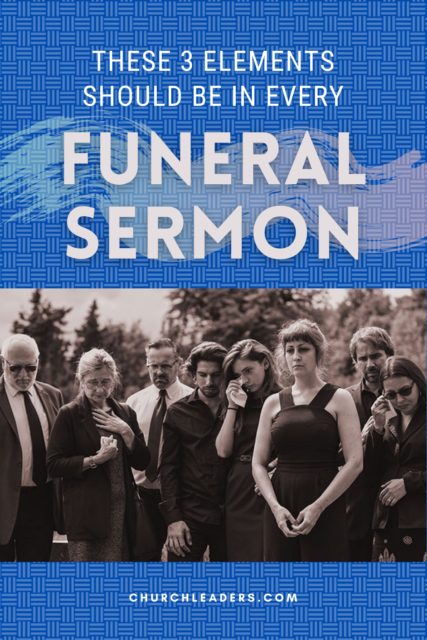What elements should be in every funeral sermon?
I was contacted last week by a pastor asking this question and thought there might be others asking it also. The most helpful advice I ever received about preaching at a funeral for someone I didn’t know is: “Don’t preach them into heaven. Don’t preach them into hell. Just preach the gospel for the people who are there.” This principle captures our task regardless of the kind of funeral we do. Ironically, though we focus on remembering and celebrating the life of the deceased, the funeral service is ultimately for those who attend.
The sermon is where the gospel must be preached clearly. Only when we can personally have confidence in a person’s conversion should we feel comfortable to speak of the heavenly reward he/she has now received. If there is any doubt in your mind, it is best to focus on the gospel for your hearers and resist the temptation to provide a false comfort that you have little or no basis to give.
3 Elements That Should Be in Every Funeral Sermon
A funeral sermon should not exceed 20 minutes and should highlight these three categories, preferably expounded from a text(s) of Scripture:
1. Acknowledge the need to grieve.
The story of Jesus raising Lazarus from the dead (John 11) is particularly helpful as there seems to be a legitimate time of grieving for those present and sorrow for those who are experiencing the separation that death brings, including Jesus who wept (John 11:35). I often share of the time my father sat my wife and me down, once we found out we had miscarried with our second child, and exhorted us to take time to grieve over this child, instructing us how to do so.
Don’t ever presume that people realize that grief is appropriate or that they know how to work through their grief by simply talking about their deceased loved one. In actuality, many do not want to talk about them because of the hurt felt in loss. Many pastors know that often, years later, people learn the value of this process, eventually working through the grief with some pastoral guidance.
2. Make the hope of the gospel clearly known.
True hope in grief cannot come apart from the hope of the gospel. This is why the second and third portion of a funeral sermon focus on Christ’s person and work. Whatever text you choose to preach, make sure you are able to focus on the clear elements of the gospel from it: God’s holiness, man’s sinfulness and deserving judgment, Christ’s perfect personhood and atoning work to save us, our essential response to repent and believe upon Christ.
3. Call your hearers to respond to the gospel.
To do so appropriately and effectively, you must prepare by knowing as much as you can about your hearers as well as the deceased. You should assume Christians and non-Christians are present. You should assume they all have come with a preconceived understanding on how we receive eternal life. For example, I have done a funeral where 90 percent of those in attendance were devoted Catholics, another who were Mormons and another where no one in the building had ever stepped foot in a church.
In every case, I explained the gospel clearly, called my hearers to repent of their sins, believe upon Christ and trust in him. Yet, in each of these different situations, I approached calling them to respond to the gospel differently, depending upon their preconceived understanding of the “good news.” Exhort them to grieve. Preach the gospel clearly and simply. Help them understand their need for Christ as death is before them. Call them to repent and believe.














